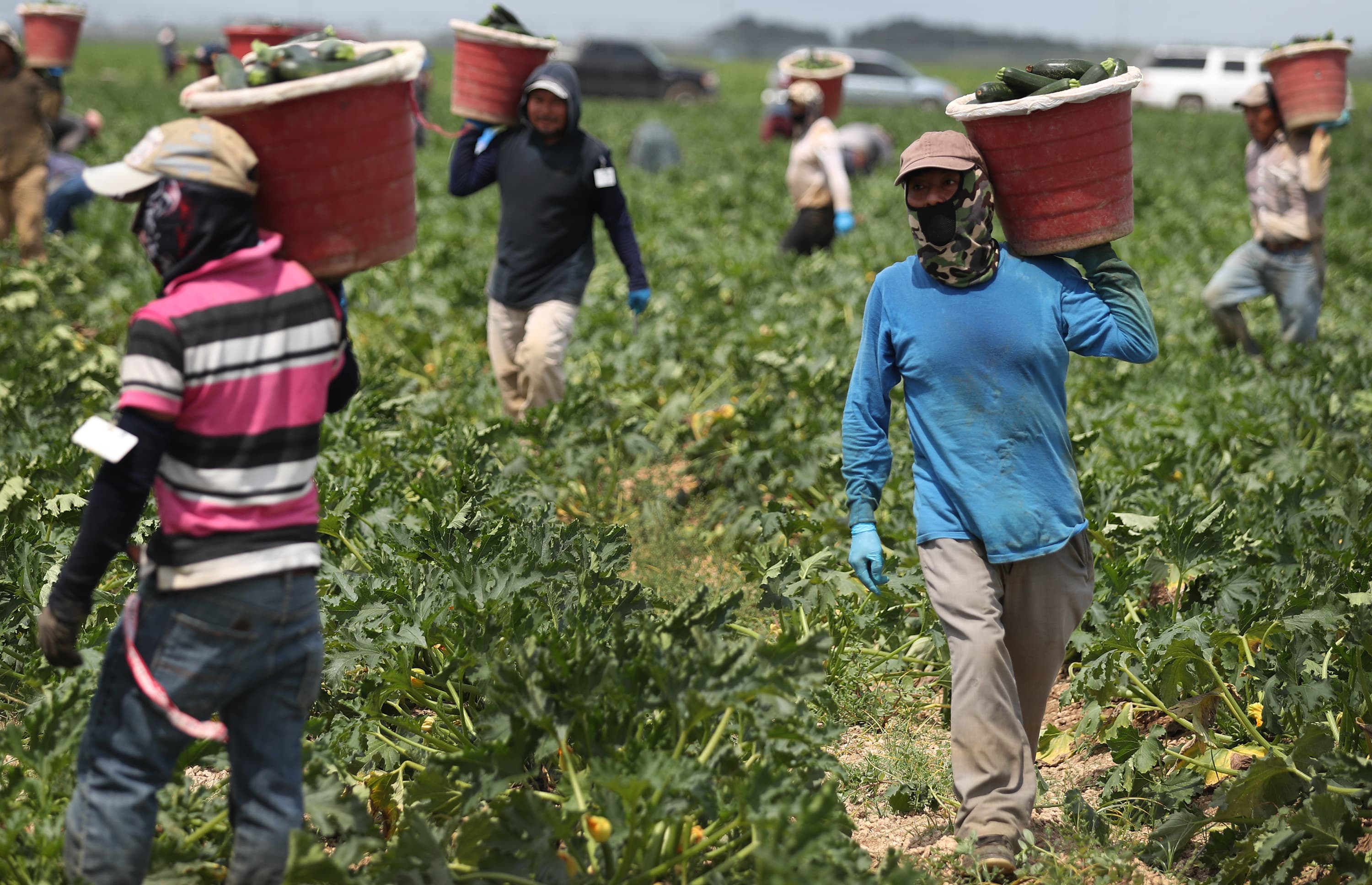At farms across the country, workers are contracting Covid-19, sparking concerns about how to protect the low-wage laborers.
Millions of Americans are working from home after their governors told them to shelter in place, but farmworkers, grocery store employees and other essential workers don’t have the option as they try to maintain the national food supply.
The U.S. meat supply has already seen production lag due to outbreaks in slaughterhouses and meatpacking plants. The Centers for Disease Control and Prevention found that more than 16,200 workers across 23 states have tested positive for the virus. Total production of federally inspected red meat and poultry fell 8% in April and 13% in May, according to data from the U.S. Department of Agriculture.
But while meatpacking workers were falling ill, cases among farmworkers didn’t become a concern until early summer, when many labor-intensive crops needed to be harvested. In June, Florida Gov. Ron DeSantis blamed a surge of new coronavirus cases on farmworkers and day laborers, although cases were spiking outside of agricultural areas, leading state Latino leaders to call on him to apologize for his comments.
California has seen its overall cases surge in June and July, and it recently passed New York for total confirmed cases. It also hosts half of the country’s farm worker population, who harvest crops from wine grapes to mushrooms.
Marielos Cisneros, a production clerk for Primex Farms in Wasco, California and a single mother, tested positive for Covid-19 in June and still feels nauseous when she eats. She said that the farm’s human resources department told her not to tell other employees about her diagnosis. Cisneros believes her four children caught the virus from her.
Primex Farms, which grows pistachio nuts, denied the allegation that any of its management representatives told employees to hide a positive diagnosis.
“We are very proactive and encouraging employees to report any COVID related symptoms,” a spokesperson said in a statement to CNBC. “We have also done contact tracing by sending everyone with potential exposure to get tested, and we are not allowing employees to come to work who have shown any of the COVID-19 symptoms.”
Primex said that it has tested all of its employees for Covid-19, and 150 workers tested positive. Over 70 have returned to work with permission from a medical professional or a health department official.
Most farmworkers labor outside, where the risk of catching the virus is lower and social distancing is easier. Instead, the larger risks come outside of work. H-2A visas for temporary agriculture workers require that employers provide housing, transportation to and from work and access to a kitchen at no extra cost for their migrant workers. The labor camps typically resembles barracks, and social distancing is difficult.
“Not too many small family farmers have the resources to hire someone to, say, clean the bathrooms three or four times a day, and same goes with the kitchen,” said Baldemar Velasquez, president of Farm Labor Organizing Committee, a branch of the AFL-CIO that represents workers in the Midwest and South.
Nearly 200 farmworkers living at such a facility in Oxnard, California tested positive for Covid-19 in early July.
“A lot of places are operating just as usual,” said Armando Elenes, secretary treasurer of United Farm Workers, which primarily represents laborers in California, Oregon and Washington.
Velasquez said that the companies buying tobacco, fruits and vegetables from farms should issue an emergency one-year increase in prices to give small family farmers enough funds to make their labor camps safer.
“These companies are not hurting for money. The only thing that they’re hurting for is increased profits,” he said.
Velasquez said that he suspects there are many unreported cases. He said some workers may be reluctant to get tested for Covid-19 because they fear not being paid while they are quarantining or recovering from the illness, although legally their employer must pay them.
The Families First Coronavirus Response Act requires businesses with fewer than 500 employees to cover paid leave related to Covid-19 through the end of the year, offering some protection to low-wage laborers. The UFW advocated for an expansion to cover larger farms with the state of California and won. But less than half of farmworkers surveyed in 2015 and 2016 for the Department of Labor’s National Agricultural Workers Survey had health insurance.
“They’re so used to working even when they’re sick, just working through it,” Elenes said.
Cisneros said her health insurance covered some of her medical expenses stemming from Covid-19. She only received a few hours worth of sick pay from Primex Farms until she and her coworkers went on strike, demanding free face coverings, better sanitation measures and more information about sick employees. Now, she said that Primex is retaliating against her and trying to get her to quit, at a time when the national unemployment rate is 11.1%.
Primex denied that its employees were ever on strike and said that it has been paying out the required sick pay since the California mandate was made law. The company also denied that it is retaliating against any of its employees.
Some farm workers might also be motivated not to get tested because a positive Covid-19 test could also disrupt their future work prospects.
“If they feel that their labor contractor or supervisor disapproves of their not working, then they won’t be recruited to come back next year,” Velasquez said.
